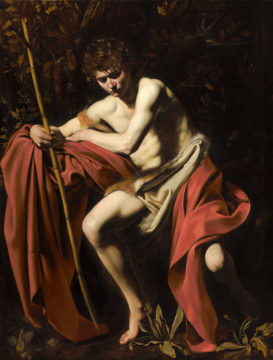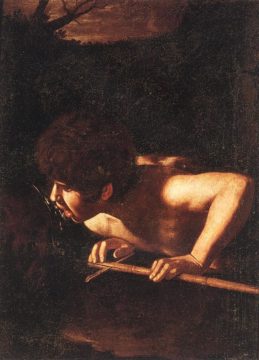On this Eighteenth Sunday of Ordinary Time Fr. Paul Gallagher, OFM writes with a Franciscan perspective on this Sunday’s Gospel which begins with the death of John the Baptist. The reflection and questions are edited by Franciscan Sister of Christian Charity Sister Anne Marie Lom and Joe Thiel. The excerpts from the Sunday readings are prepared by Joe Thiel. To read or download the complete pdf with excerpts for your prayer, please click here: Franciscan Gospel Reflections August 2 2020 Excerpts are from the Lectionary for Mass for Use in the Dioceses of the United States of America, second typical edition © 2001, 1998, 1997, 1986, 1970 Confraternity of Christian Doctrine, Inc., Washington, DC. Used with permission. All rights reserved. No portion of this text may be reproduced by any means without permission in writing from the copyright owner. (Photos: By Caravaggio – qgFz_54y0Kfktw at Google Cultural Institute maximum zoom level, Public Domain, https://commons.wikimedia.org/w/index.php?curid=21977132 and By Caravaggio – Web Gallery of Art: Image Info about artwork, Public Domain, https://commons.wikimedia.org/w/index.php?curid=15452237)
Matthew 14:13-21
When Jesus heard of the death of John the Baptist, he withdrew in a boat to a deserted place by himself. The crowds heard of this and followed him on foot from their towns.
When he disembarked and saw the vast crowd, his heart was moved with pity for them, and he cured their sick. When it was evening, the disciples approached him and said, “This is a deserted place and it is already late; dismiss the crowds so that they can go to the villages and buy food for themselves.” Jesus said to them, “There is no need for them to go away; give them some food yourselves.” But they said to him, “Five loaves and two fish are all we have here.” Then he said, “Bring them here to me,” and he ordered the crowds to sit down on the grass. Taking the five loaves and the two fish, and looking up to heaven, he said the blessing, broke the loaves, and gave them to the disciples, who in turn gave them to the crowds. They all ate and were satisfied, and they picked up the fragments left over–twelve wicker baskets full. Those who ate were about five thousand men, not counting women and children.
Background:
The fourteenth chapter of Matthew’s gospel begins with an account of Herod’s beheading of John the Baptist (Matthew 14:1-12). The banquet where Herod did this stands in contrast to the “banquet” that Jesus provides in this text. Herod’s banquet was for an elite group, and it led to the death of John the Baptist. Jesus’ banquet is inclusive. Presumably the sick that came to him are present among the crowd, along with the disciples, and perhaps even some who reported back to the scribes and Pharisees everything that Jesus said or did. They were all invited to this banquet that was provided for them without cost. This banquet ended with twelve wicker baskets full of food being left over after everyone had eaten.
In the first line of the text today, Matthew states that when Jesus heard of the death of John the Baptist, he withdrew to be by himself. The gospel text does not indicate what Jesus might have been thinking as he sought out some quiet place by himself, nor does it indicate what might have been his motivation for engaging the sick and the rest of this crowd. Matthew simply records this incident in the life of Jesus without explanation. The feeding of the 5,000 is the only Galilean miracle that is recorded in all four gospels (Matthew 14:14-21, Mark 6:35-44, Luke 9:12-17, and John 6:1-13). Matthew is the only one who places this incident immediately after Jesus hears of the death of the Baptist. Mark and Luke place it at the disciples’ return from having been sent out to preach. John places the event at the end of one of Jesus’ discourses where he questions his listeners on how they will accept his teachings.
Matthew sets this banquet in a deserted place. In reality it is not deserted, because Jesus instructs them to be seated on the grass. The location is also close enough to cities of the day to suggest that the crowd could have been dismissed to go and purchase provisions. But being a deserted place has other significance. The location would remind those who heard this text of the exile when their ancestors ate manna from heaven. They would also know of texts like today’s first reading (Isaiah 55:1-3), where the prophet tells a people who know the pain of hunger that God longs to prepare a rich banquet for God’s people. Still another banquet that is brought to mind by Matthew in this text is that of the last supper, where “Jesus took the bread, said the blessing, broke it, and giving it to his disciples, said… (Matt 26:26). The members of Matthew’s community, and we as well, are reminded of their weekly celebration of the Lord’s Supper.
The contemporary reader might be offended by the last verse of the text. In the culture of the day, men and women did not associate together in public. In the situation described in the gospel text, the women and children would have been naturally separate from the men. The fact that the text makes mention of how many men were fed but not how many women and children would have been appropriate for the time when it was written. What would have been totally amazing for people of the day was that Jesus provided a meal for even the poor, the sinners, and those who could not repay him. This would have been unheard of in their society. Think of all the times Jesus is ridiculed for eating with sinners. Here he has provided a miraculous banquet for a throng of people that included peasants, sinners, and the ritually impure. Jesus’ actions confront both the social norms of the day and the traditional understanding of their relationship with God.
Reflection Questions:
- How have you been affected by the death of a close friend or relative? What did you do after receiving the news? Has someone’s death ever led to a significant change in your life?
- How do you think Jesus heard about the death of John the Baptist? How do you think he responded to people who came to him to offer their condolences?
- Why do you think Matthew placed this incident in the life of Jesus right after he hears of the death of John the Baptist?
- What do you think the disciples were thinking when Jesus told them that they themselves should give the crowd something to eat?
- What do you think the people were thinking as word passed among them that they should sit down to prepare for a meal? Where in our present world might people have similar feelings?
- Have you known real hunger? Do you know people who are hungry on a regular basis? How does it affect you? What effect does your experience have on how you hear this gospel?
- What do you think is the point of “picking up the fragments?”
- Can you take time to talk with God about the effect of a death, or about the effects of hunger, or about whatever it is that Jesus is teaching you in this text?




